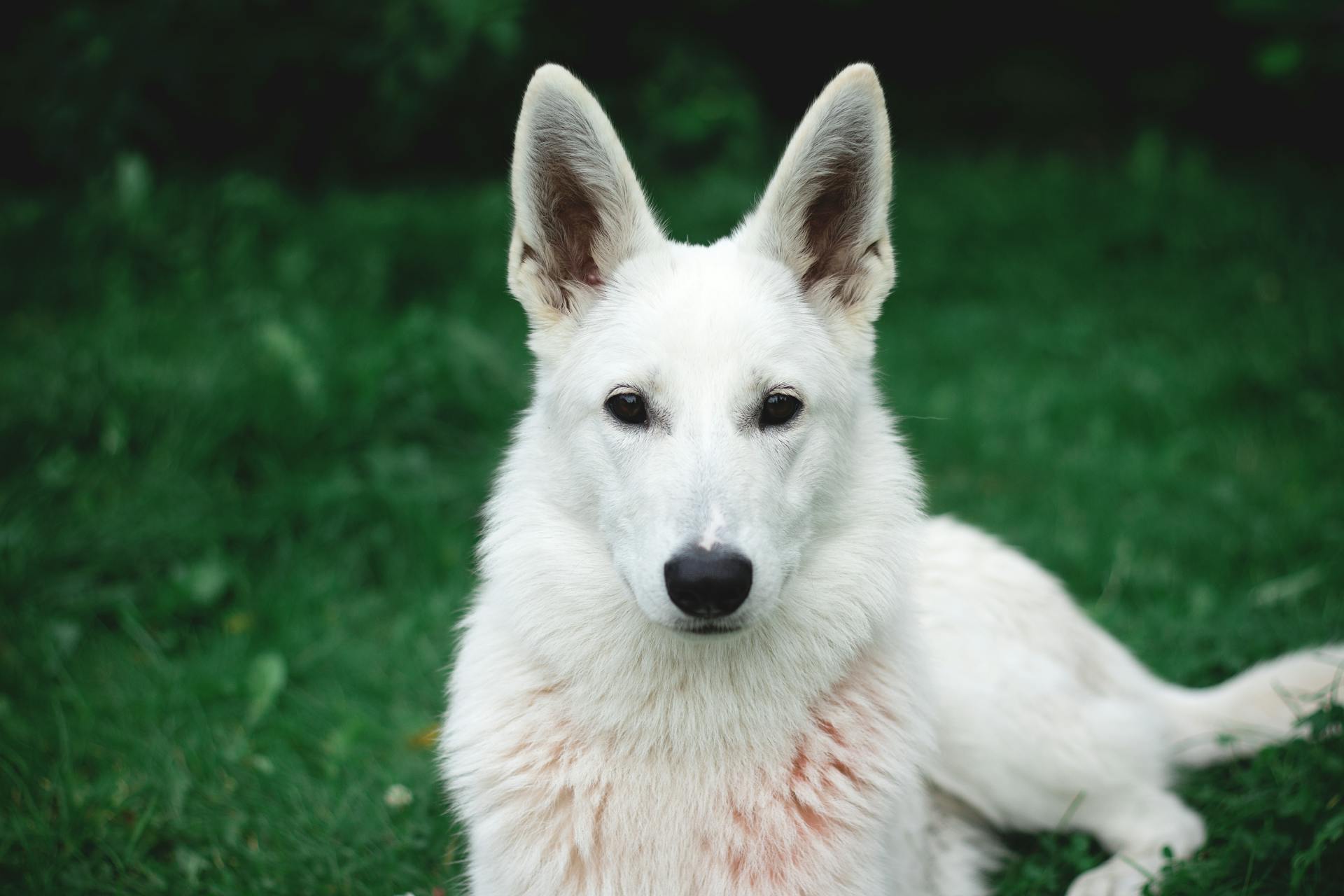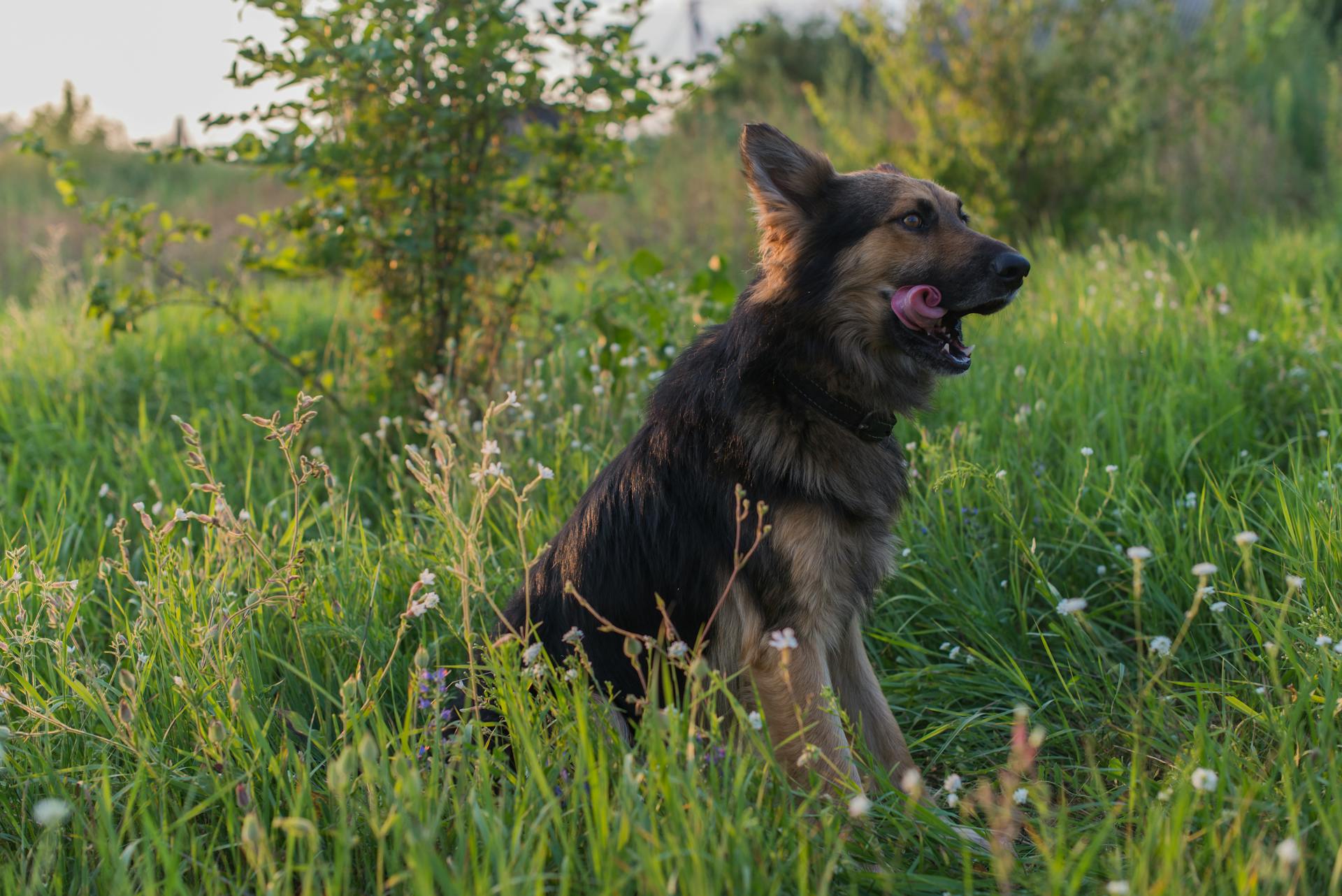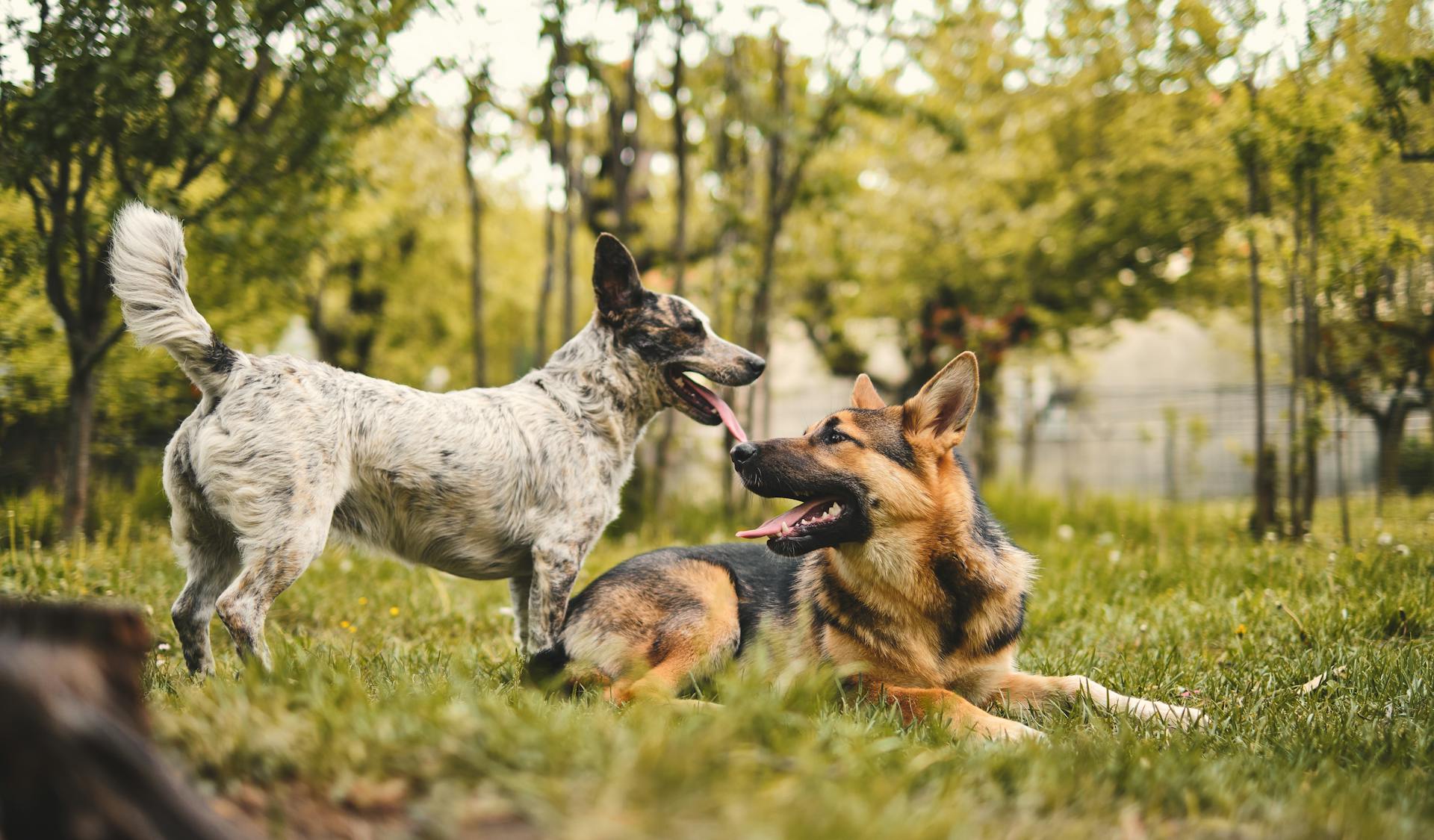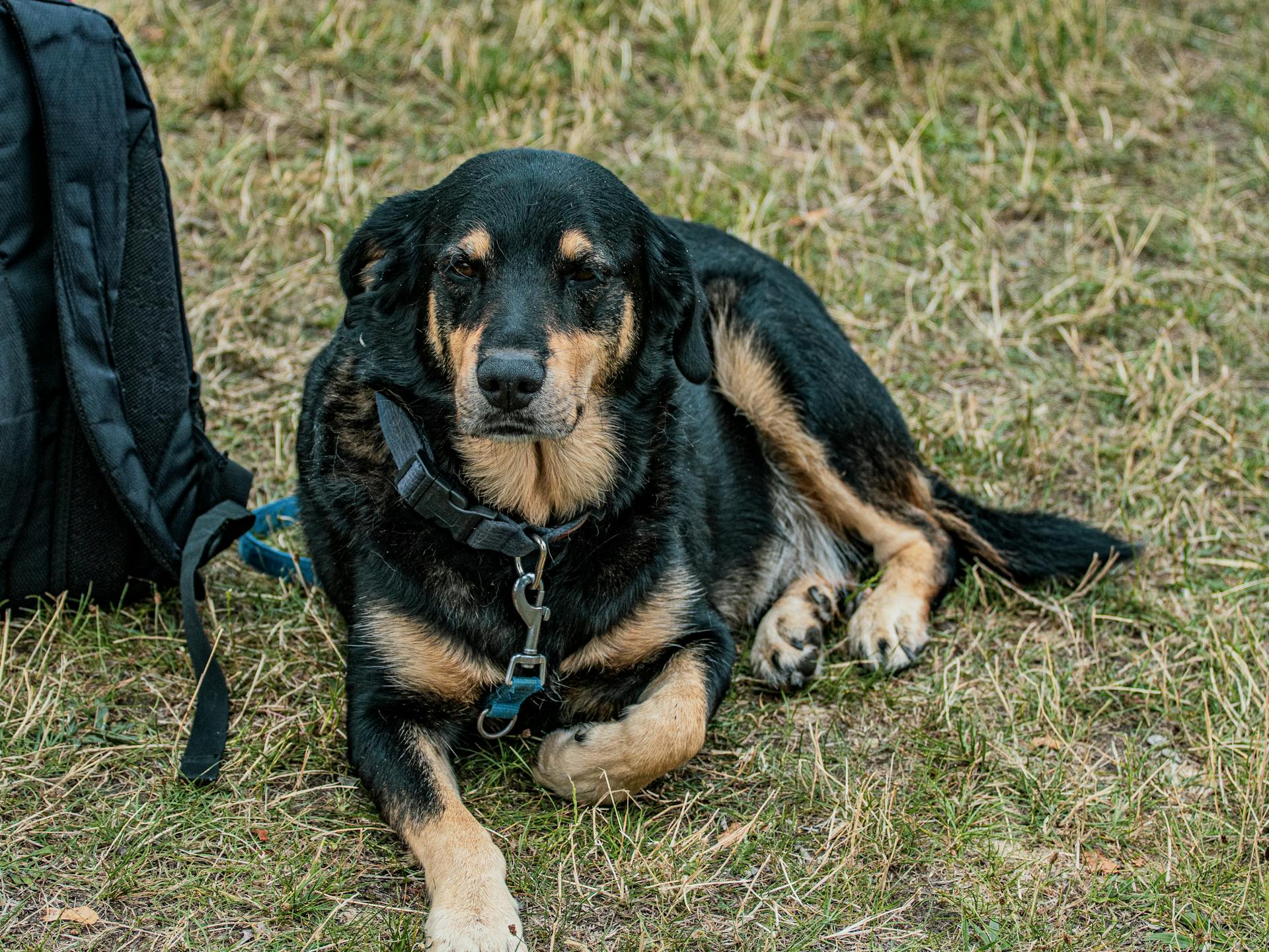
German Shepherds are naturally loyal and protective of their families, but their temperament can be a bit misunderstood. They are not naturally aggressive, but rather alert and watchful.
Their intelligence and high energy levels make them thrive on mental and physical stimulation. German Shepherds need regular exercise and training to prevent boredom and destructive behavior.
In fact, German Shepherds are one of the most popular breeds for search and rescue, guide dogs, and police work, due to their high trainability and strong work ethic. This is a testament to their intelligence and ability to focus.
German Shepherds are also known to form strong bonds with their family members, often becoming Velcro dogs that love to be close to their people.
You might like: Are German Shepherds High Maintenance
Temperament and Traits
German Shepherds are naturally protective dogs, but they're also great family members and get along well with kids and other animals. They have a strong desire to please their owners, making them highly obedient.
Their intelligence and bravery make them excellent guard dogs and popular choices for roles like K9s and search-and-rescue dogs. German Shepherds are also known for their loyalty to family, forming strong bonds and being protective of their loved ones.
With proper training and socialization, German Shepherds are generally gentle and affectionate, making them a great addition to many families. They're highly adaptable and can thrive in various environments, from farms to cities, as long as they receive regular exercise and mental stimulation.
Positive Temperament Traits
German shepherds are naturally protective dogs and are generally great family members. They get along well with kids and other animals.
Intelligence is one of the key positive temperament traits of German shepherds. They are quick to learn new things and can excel in various training and working roles.
Their work drive is also a notable characteristic. German shepherds are happiest when they have something to do, thanks to breeding.

Loyalty is a defining feature of the breed. The GSD is well-known for its loyalty to family, forming strong bonds and being protective of family members.
Courage is another positive trait of German shepherds. They are famous for their roles as K9s, military dogs, and search-and-rescue dogs thanks to their fearlessness and bravery.
Alertness is also a significant aspect of their temperament. GSDs have an exceptional sense of alertness, which is why they are popular as watchdogs.
Confidence is a key characteristic of German shepherds. They possess a confident and composed demeanor, handling new situations with ease.
Obedience is also a notable trait of the breed. Due to their high level of intelligence and eagerness to please their owners, German shepherds are highly obedient dogs.
Here are some specific positive temperament traits of German shepherds:
- Intelligence
- Work drive
- Loyalty
- Courage
- Alertness
- Confidence
- Obedience
Their adaptability is also worth noting. German shepherds thrive in various environments, from farms to bustling cities.
Energetic is a fitting description of the breed. German shepherds are active dogs that thrive on physical exercise and mental stimulation.
Playfulness is another side of their temperament. Don't let their serious looks fool you; German shepherds also have a playful side.
Easy grooming is a bonus for owners. GSDs have a relatively low-maintenance coat, which is easy to groom.
Territorial Instincts
German Shepherds are naturally protective breeds with strong territorial instincts, making them excellent watchdogs and loyal protectors.
This instinct can manifest as unfriendly behavior, especially towards strangers or unfamiliar animals entering their territory.
Without proper training and boundaries, a German Shepherd may become overly possessive, viewing almost any unfamiliar presence as a potential threat.
In extreme cases, this can lead to aggressive posturing, barking, or even biting.
Interactions with Strangers
German Shepherds are generally cautious around strangers due to their protective nature. This is rooted in their history as guard and police dogs, where their sharp instincts and intense physicality made them ideal for protective roles. However, their behavior largely depends on training, socialization, and individual temperament.
A study by the American Temperament Test Society found that German Shepherds have an 85.3% temperament pass rate, which is relatively high among all breeds. This suggests that they are not inherently aggressive, but rather, their protective nature can be channeled correctly through proper upbringing and training.
Proper training and socialization can shape a German Shepherd into a gentle giant, even around strangers. A good bond with their handlers and thorough training can reduce the risk of aggression, making them a friendly and loyal companion.
Additional reading: Are German Shepherds Protective
OK with Strangers?

German Shepherds are generally cautious around strangers due to their protective nature. However, with proper training and socialization, they can be welcoming.
A study by the American Temperament Test Society found that German Shepherds have an 85.3% temperament pass rate, which is relatively high among all breeds.
Their response largely depends on upbringing, environment, and individual temperament. Their background as herding and guarding livestock often explains their initial skepticism towards strangers.
While they might not instantly warm up, it doesn’t mean they're inherently aggressive. Many German Shepherds serve as therapy and service dogs, requiring a calm and friendly demeanor.
With early socialization and exposure to diverse people and environments, a German Shepherd can become well-rounded and accepting. Notably, many German Shepherds are used as therapy and service dogs, showcasing their potential for calm and friendly behavior.
Take a look at this: Are Shiba Inus Friendly
Scared of Strangers
German Shepherds aren't typically scared of strangers, but they're naturally cautious due to their protective instincts.
Their protective instincts prompt them to assess unfamiliar people, ensuring their family's safety. This doesn't mean they're fearful; they're wired to be vigilant.
German Shepherds have keen senses, especially acute hearing, which can detect sounds at four times the distance humans can. This allows them to stay alert to environmental changes.
Studies suggest that dogs, including German Shepherds, can read human body language exceptionally well, often relying on subtle cues. This helps them gauge the intent of strangers.
Most German Shepherd owners describe their pets as 'curious' rather than 'fearful' when encountering unknown individuals.
Interactions with Other Animals
German Shepherds can be friendly with other dogs when socialized early, thanks to their collaborative heritage as herding dogs. Positive introductions, training, and individual temperament all play a role in shaping these interactions.
A well-adjusted German Shepherd can form lasting bonds with canine companions, but a survey by the German Shepherd Dog Club of America highlights the importance of early socialization, especially between 3 to 14 weeks. Puppies exposed to various dog breeds and sizes during this period tend to be more adaptable and accepting in adulthood.
Structured playdates are also valuable in fostering friendly behavior, allowing German Shepherds to learn appropriate play manners and reducing the chances of territorial disputes, as emphasized by the American Veterinary Society of Animal Behavior.
Intriguing read: Are Husky Dogs Friendly
Friendly to Cats

German Shepherds can coexist harmoniously with cats, especially if introduced early and trained appropriately. While they have a natural prey drive, proper socialization can foster friendly relationships between these two distinct pets.
Consistent guidance is key to mutual respect. The American Kennel Club (AKC) notes that early introductions are game-changers. Puppies introduced to cats during their formative weeks tend to view them as part of the family rather than prey.
Historically, German Shepherds were bred for herding, which means they have a pronounced prey drive. This instinct can sometimes be mistaken for aggression towards smaller animals like cats. A study in Applied Animal Behavior Science found that dogs are more accepting of cats when both are raised together from a young age.
Individual temperament plays a significant role. Some German Shepherds are naturally more relaxed, while others might require more guidance. With patience, consistent training, and early exposure, the age-old tale of "cats and dogs" can have a harmonious twist for German Shepherds.
For your interest: How Long Do White German Shepherds Live
Socializing with Pets
Socializing with pets is crucial for your German Shepherd's development, and it's best to start early. A survey by the German Shepherd Dog Club of America found that puppies exposed to various dog breeds and sizes between 3 to 14 weeks tend to be more adaptable and accepting in adulthood.
To socialize your German Shepherd with other pets, introduce him to as many as possible from an early age. Keep him on a leash and give him the occasional treat when he plays calmly, as suggested by Caitlin Crittenden, a dog trainer.
Historically, German Shepherds worked in groups as herding dogs, requiring cooperation with other canines. This collaborative heritage can facilitate positive interactions in modern settings.
German Shepherds can form lasting bonds with canine companions when socialized early and given positive introductions, training, and individual temperament. A well-adjusted German Shepherd can thrive in multi-dog households with understanding, patience, and guidance.
Structured playdates are a valuable tool in fostering friendly behavior in German Shepherds. Controlled environments allow them to learn appropriate play manners and reduce the chances of territorial disputes, as emphasized by the American Veterinary Society of Animal Behavior.
Individual personalities matter, and while some German Shepherds are inherently more gregarious, others might be reserved. Most German Shepherds can be as welcoming and gentle with visitors as any other breed, but it all boils down to their upbringing and experiences.
Improving Friendliness
Consistent socialization is key to making your German Shepherd more friendly. It's essential to expose them to various people, other animals, environments, and sounds during their formative weeks, typically between 3 and 14.
Positive reinforcement training, regular exercise, desensitization, and playdates can also help foster a more approachable demeanor. By avoiding punitive measures and providing mental stimulation, you can create a trusting relationship with your dog.
Here are 11 proven ways to make your German Shepherd friendlier and more sociable:
- Early Socialization
- Positive Reinforcement
- Obedience Training
- Regular Exercise
- Desensitization
- Playdates
- Avoid Punitive Measures
- Provide Mental Stimulation
- Trust-Building
- Health Check-ups
- Seek Professional Help
Friendly or Aggressive?

German Shepherds have the capacity to be both very friendly and aggressive, depending on their socialization, training, and unique circumstances. Thorough training and a good bond with their handlers reduce the risk of aggression.
Their loyalty to their family means they'll be vigilant, but with proper introductions and consistent training, they often greet guests with warmth and wagging tails. German Shepherds rank second in the list of America’s most popular dog breeds, which speaks volumes about their adaptability to family life and interaction with guests.
Historically used as herding and police dogs, their instinct is to assess the situation first. Their heightened sense of hearing allows them to recognize familiar sounds, like a regular visitor's footsteps or voice, often before their owners do!
Early socialization is key to their friendly nature. Puppies exposed to various dog breeds and sizes during their critical developmental period, between 3 to 14 weeks, tend to be more adaptable and accepting in adulthood.
For your interest: How Often Should You Bathe German Shepherds
Improving Your Dog's Friendliness
Socialization is key to laying the foundation for a friendly dog. Exposing puppies to various people, other animals, environments, and sounds during their formative weeks (typically between 3 and 14) helps mold a well-rounded and confident adult dog.
Proper training is also essential in fostering friendly behavior. Structured playdates, such as those recommended by the American Veterinary Society of Animal Behavior, allow German Shepherds to learn appropriate play manners and reduce the chances of territorial disputes.
Early socialization can be achieved by introducing your puppy to as many different kids as possible of all ages. This is particularly important for German Shepherds, which have natural prey instincts, and socializing can make them understand that kids are friends to be treated with care.
Positive reinforcement training is a valuable tool in shaping your dog's temperament. Consistent socialization, positive reinforcement training, and exposure to various environments can help build trust and foster a more approachable demeanor.
Here are 11 proven ways to make your German Shepherd friendlier and more sociable:
- Early Socialization
- Positive Reinforcement
- Obedience Training
- Regular Exercise
- Desensitization
- Playdates
- Avoid Punitive Measures
- Provide Mental Stimulation
- Trust-Building
- Health Check-ups
- Seek Professional Help
By incorporating these methods into your dog's daily routine, you can help improve their friendliness and create a more harmonious household.
Reasons for Unfriendly Behavior
German Shepherds may behave differently with people outside of your family because they are protective, which can make them unfriendly to strangers.
This protective nature is a great quality for a family dog, but it's essential to understand it's a breed trait that can be challenging to manage.
German Shepherds are usually not friendly to strangers, which is why it's a good breed for many people who value their loyalty and protection.
As a large breed, German Shepherds are less likely to get hurt by children running around or playing with them, making them a great fit for families with kids.
However, this protective nature can sometimes lead to unfriendly behavior, especially if they feel their family is being threatened.
It's crucial to socialize your German Shepherd well to help them become more confident and friendly around new people and environments.
Owner Relationships
German Shepherds are known for their loyalty and willingness to please their owners, making them a great breed for families. This bond is rooted in trust and mutual respect, which can shape the dog's behavior and temperament.
A German Shepherd's temperament is influenced by its relationship with its owner, and with proper training and socialization, they can become a loyal and affectionate companion. They thrive on attention and interaction, making them a great addition to active families.
To build a strong relationship with your German Shepherd, it's essential to establish trust and respect. This can be achieved by providing regular exercise, mental stimulation, and positive reinforcement training.
In order to ensure a smooth interaction between your German Shepherd and your kids, it's crucial to socialize your dog and teach them basic obedience commands. This will help them understand boundaries and behave well around small children.
Here are some key takeaways to consider when building a strong relationship with your German Shepherd:
- Provide regular exercise and mental stimulation to keep your dog happy and engaged.
- Teach your dog basic obedience commands to establish trust and respect.
- Socialize your dog to ensure they understand boundaries and behave well around children.
Frequently Asked Questions
Are German Shepherds friendly to strangers?
German Shepherds can be welcoming and gentle with visitors, but may initially appear reserved. With proper introduction and positive reinforcement, they can become friendly and social with strangers.
Are German Shepherds good house dogs?
German Shepherds can make great house dogs for active families with proper training, but they require careful handling to prevent anxiety or aggression. With the right care, they can be a loving and loyal companion for families with children.
What are the cons of owning a German Shepherd?
Owning a German Shepherd requires a significant time commitment for mental stimulation and exercise. Additionally, this breed sheds heavily, resulting in excess dog hair in the home.
Are German Shepherds good with dogs?
German Shepherds can get along well with other dogs if socialized properly, but their guarding instincts may lead to wariness around unfamiliar canines. Proper training and socialization are key to a harmonious household with multiple dogs.
Sources
- https://www.forbes.com/advisor/pet-insurance/pet-care/german-shepherds-temperament/
- https://gsdcolony.com/blogs/news/are-german-shepherds-friendly-to-strangers
- https://nativepet.com/blogs/health/are-german-shepherds-good-with-kids
- https://wagwalking.com/training/train-a-german-shepherd-to-be-friendly
- https://www.petsmont.com/blogs/pets/here-is-why-german-shepherds-are-good-with-kids
Featured Images: pexels.com


